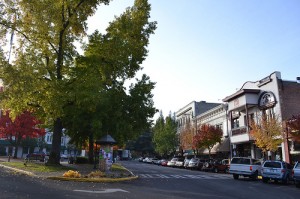I’ve been thinking a lot about the urban-rural divide, i.e. the lack of goodwill and respect between the city-folk of the United States and the folk
of its smaller towns and rural areas.* While I live in a big city (Portland, Oregon is the 23rd largest city in the U.S) my work takes me steadily to small towns and rural areas. I’ve got to say, I love these places. I feel joyful and intensely alive when I’m in them. I also love Portland. I straddle the urban-rural divide, a leg in each camp.
I mentally wrote much of this two-part piece on why small towns rock as I drove recently for long, peaceful hours between small towns on lush byways near rivers and the coastline of southern Oregon. My not-so-secret agenda is for urban folk to wake up to the things that make small towns and rural areas great, too.
- People spout significantly less B.S. in small towns than in bigger cities. They’re more likely to say what they mean, and behave in sincere ways, and do these things consistently. Urban folk tend to be so rushed and have so much going on, they can become glib and careless, throwing words and actions around like cheap paper confetti, and then disappearing before it hits the ground. Some think (often correctly) they’ll never see you again, so they take shortcuts on decency. Lots of movies have been made about people’s B.S., both verbal and behavioral, in big cities. I got hustled once by a fast-talking fellow in Miami who had such a plausible story about needing fare for the bus arriving in two minutes because someone had just now stolen his two dollars from him that I put two dollars into his hand- and realized as he rushed away that his story had been pure B.S. Quite a low-cost lesson, I think.
Just to be clear, crime can and does happen wherever people exist, including in rural areas. However. I’ve never been hustled in all the hundreds of hours I’ve spent in small towns. People feel more accountable for their words and behaviors in small venues, partly because they know they could run into you again. There is no sea of people for anyone to disappear into.
- You don’t get lost in small towns. This is a no small thing, especially if, like me, you’re good at getting lost. When I drove into Bandon, Oregon last spring for the first time in fifteen years I turned off Highway 101 and in 30 seconds was at my destination, the Sea Star Guest House, right across from the harbor. I mean, I was there without even trying to get there. I loved that.But even if you’re a whiz with GPS (formerly MapQuest, formerly actual paper maps – remember?) it can take a lot of energy to navigate dense, congested places like San Francisco, and sprawling, congested places like Los Angeles and its suburbs. On the other side of the divide, you spend more time being there, rather than working on getting somewhere.
- People in small towns tend to be helpful. Need advice? They’ll probably look you in the eye and give what you need some genuine thought. On the small chance you do need help in finding your destination, the residents are engaged by this. They don’t blow you off, or charge you money for directions like Julia Roberts hilariously did to Richard Gere in L.A in Pretty Woman. They may get personally invested in you landing in the place you belong. I’ve seen a stranger walk an out-of-towner several blocks to where they needed to be, and wave away their thanks as if the interruption had been a pleasure. This graciousness is partly on account of not being burned out, i.e. not having millions of people traipsing through getting lost, trashing their town and/or asking for help. As a visitor, you’re not part of an overrepresented group, so they’re not jaded.
- That subtle, golden thing called trust is in much stronger currency in small towns than in big cities. I wrote last month about a shop/cafe called Alpha Bit in Mapleton, Oregon offering to let me pay for my $17 worth of books with an I.O.U. when I didn’t have cash and they didn’t take cards. And of course I promptly mailed them a check after getting home to Portland. You can bet I’m going back to that store to do more business with them. Trust like this doesn’t get extended in big cities, except sometimes to regular customers in some neighborhood enclaves. But I was a stranger in Mapleton. I see human trust as a form of wealth, one that makes everyone involved richer, at nobody’s expense.
- Many rural and small town folks know how to grow, gather, catch or hunt food. City folks ought to be very humble about this. The food that keeps us all alive doesn’t get created by urban grocery stores any more than money gets created by ATM machines. It gets created by people’s skilled work, and soil and water, all generally far outside of city boundaries. In June I brushed up against the ancient tradition of crabbing on the southern Oregon coast and reported the surprising things I learned.
*The urban-rural divide has political, financial and even digital aspects, besides the psychological ones that draw my interest. I”ve also been intrigued to learn that the same divide exists in other countries like China and India. So, the divide is a global issue, not just a domestic one.
Soon: Part II, the conclusion to Top Ten Reasons Small Towns Rock.



 Subscribe
Subscribe
No Comments so far ↓
There are no comments yet...Kick things off by filling out the form below.